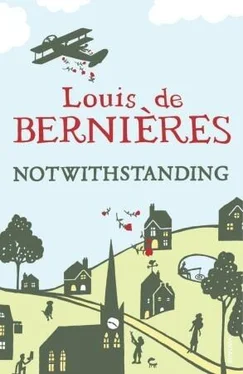Louis de Bernieres - Notwithstanding - Stories from an English Village
Здесь есть возможность читать онлайн «Louis de Bernieres - Notwithstanding - Stories from an English Village» весь текст электронной книги совершенно бесплатно (целиком полную версию без сокращений). В некоторых случаях можно слушать аудио, скачать через торрент в формате fb2 и присутствует краткое содержание. Год выпуска: 2010, Издательство: Vintage, Жанр: Современная проза, на английском языке. Описание произведения, (предисловие) а так же отзывы посетителей доступны на портале библиотеки ЛибКат.
- Название:Notwithstanding: Stories from an English Village
- Автор:
- Издательство:Vintage
- Жанр:
- Год:2010
- ISBN:нет данных
- Рейтинг книги:4 / 5. Голосов: 1
-
Избранное:Добавить в избранное
- Отзывы:
-
Ваша оценка:
- 80
- 1
- 2
- 3
- 4
- 5
Notwithstanding: Stories from an English Village: краткое содержание, описание и аннотация
Предлагаем к чтению аннотацию, описание, краткое содержание или предисловие (зависит от того, что написал сам автор книги «Notwithstanding: Stories from an English Village»). Если вы не нашли необходимую информацию о книге — напишите в комментариях, мы постараемся отыскать её.
is a funny and moving depiction of a charming vanished England.
Notwithstanding: Stories from an English Village — читать онлайн бесплатно полную книгу (весь текст) целиком
Ниже представлен текст книги, разбитый по страницам. Система сохранения места последней прочитанной страницы, позволяет с удобством читать онлайн бесплатно книгу «Notwithstanding: Stories from an English Village», без необходимости каждый раз заново искать на чём Вы остановились. Поставьте закладку, и сможете в любой момент перейти на страницу, на которой закончили чтение.
Интервал:
Закладка:
‘I’ve tried that with birds lots of times,’ says Robert, ‘and they always die. The RSPB only tell you to do that ’cause they don’t want everyone turning up with little birds for them to look after. I don’t think they care about birds at all.’
His mother has heard this speech before, and she shrugs. She suspects that he might be right. Robert has successfully brought up quite a few birds over the years, but he did once kill a thrush by feeding it too many worms. Uncle Dick says that some little birds don’t naturally know when to stop. Rooks do, though. They eat more and more slowly and hesitantly, and then stop.
Uncle Dick has spent fifteen years in London, and now he talks like a Londoner, but he has come home to Notwithstanding because of ‘something to do with a woman’. He enjoys being back home, especially the evenings gossiping and drinking beer with barley-wine chasers in the Chiddingfold Ex-Servicemen’s Club, which does not seem to have any connection with the services at all. For all anyone knows, it might have some ex-servicemen among its members. It has two distinct classes of clientele, the older men who sit at the bar and booze for hour after hour, and the younger people of both sexes who like to dance and fancy each other. Abba’s ‘Dancing Queen’ gets played several times a night in the hall at the side. There is a lovely dark-haired Polish girl who dances to it and fills every boy’s heart with longing.
Uncle Dick works at the West Surrey Golf Club, where there is a special hut for the artisans, in compensation for not being allowed in the clubhouse, and he spends all day happily driving around on large mowers, except when it’s raining, when he sits in the hut smoking roll-ups, eating Rich Tea biscuits, and drinking large cups of strong coldish milky tea with four sugars. He sells all the lost balls he finds to Bob French, the club professional, who sells them on to the members, so that occasionally, for a small consideration, a golfer is fondly reunited with a Dunlop Warwick or a Spalding Top Flite that had been presumed missing for ever. The ones that are too cut up for resale, Uncle Dick gives to Robert, who dismantles them, adding the strange squashy bags in the middle to his unusual collection. Just now Uncle Dick is spending most of his spare time constructing a proper golf green on the lawn of Mr Royston Chittock, a recent arrival from London who is planning to spend his retirement in the village. ‘Now there’s a genuine silly bugger for you,’ says Uncle Dick, whenever the subject of the newcomer crops up.
Uncle Dick is enthusiastic about the new rook. He and Robert are on their hands and knees in the hallway, gazing down at it in the log basket, where it sits in the middle of the heap of long grass that Robert has torn from the verge side. The little bird is perfectly calm, exuding dignity and self-importance. Its disproportionately large head, hunched into its shiny black feathers, combined with its pert insouciance, create an impression that is very appealing. ‘Sweet, isn’t it?’ calls out Robert’s mother from the kitchen.
‘It’s got eyes like Elizabeth Taylor,’ says Uncle Dick. ‘They’re violet.’
It is true; the bird really does have wonderfully violet eyes. ‘Let’s call it Lizzie, then,’ says Robert’s mother, but Robert demurs. ‘It might be a boy.’ In any case, Robert has a private superstition that you shouldn’t name a baby bird immediately. If you do, it always dies.
‘How do you know if it’s a boy or a girl?’ asks Uncle Dick.
‘Wait and see if it lays eggs,’ calls Robert’s mother from the kitchen.
‘Nah, you know what I mean, before that.’
‘I asked the vet once,’ says Robert, ‘and he said that the only way to tell is to cut them open and take a look.’
‘Got a Stanley knife, love?’ jests Uncle Dick, and Robert pretends to punch him in the arm.
The older man and the boy gaze down at the serene little bird with broad, soppy smiles on their faces, and then, quite suddenly, it emits a squawk so loud and alarming that the two leap backwards, as shocked as if they had been punched in the face. ‘Bleedin’ ’eck,’ says Uncle Dick. ‘That gave me shock an’ a narf.’ The fledgling emits another disproportionate squawk, and Dick says, ‘Noisy bugger. Must be hungry.’
Robert goes into the kitchen and mashes up bread, milk and Felix. It is his standard corvid mix. He rolls it into slushy balls, comes back and kneels down. The moment that the bird opens its beak to squawk again, Robert pushes a food ball right down its throat with his forefinger. It feels very warm inside the bird. Surprised by this sudden invasion of food and finger, an expression of stupid wonder appears on its face. Then it yells and gapes again, and Robert pushes more food into it. He is fascinated by the tongue, which is sharp-tipped, and hinged in the middle, with a backward-pointing spike at either side of the hinge. ‘Lethal tongue,’ says Dick. ‘It’s to stop the prey getting out,’ says Robert knowingly. Robert knows that rooks are really birds of prey, even though it never says so in the bird books. He once saw one flying low, chasing a small rat across the village green, and then seizing it and killing it in a trice by stabbing it through the eyes. It won’t be long before Lizzie takes to keeping an eye on the cat, and stealing its mice by swooping on them when they are being tortured on the lawn, leaving the cat baffled and perplexed. Lizzie and the cat will be fascinated and repelled by each other. Each would like to kill the other, but they keep a respectful distance, except when the cat is asleep, when Lizzie hops up to it, pecks it smartly in the haunch, and then skips away gleefully.
The rook does end up being called Lizzie. It much prefers men and attacks women, tugging at their hair and earrings, pecking furiously at the rings on their fingers, and even at their eyes. She has a very feminine air about her too. When she is a year old she will try to mate with Robert’s fingers, her soft feathers trembling ethereally in the palm of his hand.
Uncle Dick says, ‘Don’t get too fond of it, lad. Birds is like women, they always bugger off in the end. You’ve just got to enjoy them while they’re there.’ Robert already knows this. Members of the crow family will stay all summer, but they always leave in autumn. He has been bereaved before, and it makes no difference how much you love them, or they you.
Uncle Dick says, ‘Let’s teach it to say something,’ and every time he sees Lizzie he says, ‘Silly bugger, silly bugger, silly bugger.’
‘You could teach it something nice,’ reproves Robert’s mother, and Dick says, ‘Silly bugger’s probably more useful, innit.’
Lizzie passes through the stages of her infancy and youth. Robert makes her a little contraption out of twigs, and on it she learns to perch. Robert knows that if you don’t give them a perch they get sore backsides from sitting in their own waste. She learns to hop out of the log basket, and, just like a toddler, begins to empty the waste-paper baskets, tear things up, upset ornaments and excrete randomly. She clambers up Robert’s body, her wings beating, pricking him through his clothing with her sharp little claws, and spends most of her time sitting on his shoulder, rearranging tufts of his hair and murmuring strange, soft, guttural endearments in his ear. He wears a Breton sailor’s cap, in those days known as a ‘Donovan hat’, for those occasions when she prefers to be on top of his head, and an old tea towel for when she’d rather be on his shoulder. Uncle Dick chucks her under the chin, and says, ‘Silly bugger, silly bugger.’
To Robert she always reacts like a fledgling. Even after she has successfully pulled her first worm from the lawn, she still greets him with a gaping maw, quivering wings and vociferous affirmations of hunger. She is always in attendance when Robert’s mother is in the vegetable patch, demanding bugs and heaving at the laces of her clodhoppers. No one’s laces are safe from being tugged undone.
Читать дальшеИнтервал:
Закладка:
Похожие книги на «Notwithstanding: Stories from an English Village»
Представляем Вашему вниманию похожие книги на «Notwithstanding: Stories from an English Village» списком для выбора. Мы отобрали схожую по названию и смыслу литературу в надежде предоставить читателям больше вариантов отыскать новые, интересные, ещё непрочитанные произведения.
Обсуждение, отзывы о книге «Notwithstanding: Stories from an English Village» и просто собственные мнения читателей. Оставьте ваши комментарии, напишите, что Вы думаете о произведении, его смысле или главных героях. Укажите что конкретно понравилось, а что нет, и почему Вы так считаете.












